Foire aux questions
How do I obtain or replace a bin?
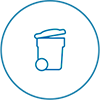 If you have just moved in, or if your household waste or selective sorting bin has deteriorated or been stolen, you can contact the « Direction Relation Usagers Collecte » to request its repair or new equipment, free of charge:
If you have just moved in, or if your household waste or selective sorting bin has deteriorated or been stolen, you can contact the « Direction Relation Usagers Collecte » to request its repair or new equipment, free of charge:
Tél. : 04 89 82 20 22
collecte@cannespaysdelerins.fr
Should packaging be washed before sorting?
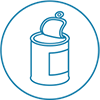 No, washing is unnecessary: sorting should not lead to wastage of natural resources like water, which then has to be treated. On the other hand, it is important to empty packaging completely of its contents so that it can be recycled correctly.
No, washing is unnecessary: sorting should not lead to wastage of natural resources like water, which then has to be treated. On the other hand, it is important to empty packaging completely of its contents so that it can be recycled correctly.
Can I put all my recyclable waste in a black bag before throwing it out?
 No, you should not place your recyclable waste in opaque plastic bags, simply because they are not opened in the sorting centre. Yellow bags must therefore solely contain recyclable waste, emptied and deposited loose (without a bag and not stashed together), to be separated by materials. Black bags and yellow bags containing other waste cannot be processed by the sorting centre and are collected with household waste. If you don’t have a sorting station, the communes of Cannes, Le Cannet and Mougins only place yellow sorting bags at their constituents’ disposal, to be deposited at Voluntary Drop-off Points.
Locate your Voluntary Drop-off Points here
No, you should not place your recyclable waste in opaque plastic bags, simply because they are not opened in the sorting centre. Yellow bags must therefore solely contain recyclable waste, emptied and deposited loose (without a bag and not stashed together), to be separated by materials. Black bags and yellow bags containing other waste cannot be processed by the sorting centre and are collected with household waste. If you don’t have a sorting station, the communes of Cannes, Le Cannet and Mougins only place yellow sorting bags at their constituents’ disposal, to be deposited at Voluntary Drop-off Points.
Locate your Voluntary Drop-off Points here
Should the stopper be thrown away with a plastic bottle?
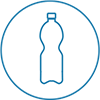 No need to throw it away separately, quite the contrary! The plastic stopper or cap is recyclable, and can be sorted along with its main container. Putting it back on your bottle when throwing it out prevents it from being lost or too small to be handled by the sorting system.
No need to throw it away separately, quite the contrary! The plastic stopper or cap is recyclable, and can be sorted along with its main container. Putting it back on your bottle when throwing it out prevents it from being lost or too small to be handled by the sorting system.
Can I stash different kinds of packaging together to save space?
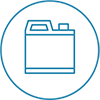 A milk bottle in a cereal box, for instance? No, that will hamper work in the sorting centre as each material is handled separately, and it would thus slow down the sorting process. To prepare for recycling, it is easier if your waste is deposited loose in your sorting bin, after being completely emptied. There is no need to compress plastic bottles. Though do make a point of folding cardboard boxes and cardboard packaging.
A milk bottle in a cereal box, for instance? No, that will hamper work in the sorting centre as each material is handled separately, and it would thus slow down the sorting process. To prepare for recycling, it is easier if your waste is deposited loose in your sorting bin, after being completely emptied. There is no need to compress plastic bottles. Though do make a point of folding cardboard boxes and cardboard packaging.
What should I do with bulky items?
 If your furniture is in good condition, one solution is to sell it or donate it to a charity. You can also take advantage of the free Cannes Lérins advertising platform: le Troc de Lérins.
If your furniture is in good condition, one solution is to sell it or donate it to a charity. You can also take advantage of the free Cannes Lérins advertising platform: le Troc de Lérins.
If not in good condition, you can drop off at the tip nearest your home or benefit free of charge from your bulky items the Mobile Sorting Centre proximity service for the smallest items.
If you cannot get around, or if these objects are too heavy or bulky, you can call your commune’s pick-up service for bulky items. They will be collected by appointment.
Further info on collection of bulky items
What does a "Point Vert" mean on packaging?
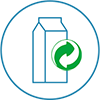 This « Green Label » indicates that the company which manufactured the packaging participates financially in collection, sorting and recycling of packaging.
This « Green Label » indicates that the company which manufactured the packaging participates financially in collection, sorting and recycling of packaging.
If you find the « Triman » logo on packaging or a product, it means that it undergoes recycling.
What should I do with used batteries and light bulbs?
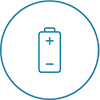 Used batteries and light bulbs should not be thrown away in household waste. Special containers are available to collect them, before they are sorted. You will find these containers in the majority of supermarkets, large stores, at the tip closest to your home, or you can benefit free of charge from the Mobile Sorting Centre proximity service. 90% of the weight of light bulbs can be recycled.
Used batteries and light bulbs should not be thrown away in household waste. Special containers are available to collect them, before they are sorted. You will find these containers in the majority of supermarkets, large stores, at the tip closest to your home, or you can benefit free of charge from the Mobile Sorting Centre proximity service. 90% of the weight of light bulbs can be recycled.
As for small and larger batteries, up to 80% of the metal they contain is recyclable and re-used in the industry. Recycling them means:
• avoiding the introduction and dispersal of heavy metals, highly toxic for people’s health and the environment,
• avoiding wastage of rare natural resources such as iron, zinc and nickel,
• rejuvenating alloys and metals: manganese, zinc, iron, steel, nickel…
Can I throw a glass dish or tableware into the bin designated for glass?
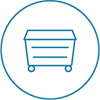 No, tableware made of glass (Pyrex), porcelain, earthenware, crystal, but also mirrors, have a different chemical composition which does not allow them to be included in recycling of glass packaging. It can however be re-used and should be deposited at the tip or Mobile Sorting Centre.
No, tableware made of glass (Pyrex), porcelain, earthenware, crystal, but also mirrors, have a different chemical composition which does not allow them to be included in recycling of glass packaging. It can however be re-used and should be deposited at the tip or Mobile Sorting Centre.
Where should I dispose of my green waste?
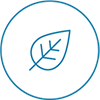 Gardens produce all kinds of green waste: dead leaves, lawn and hedge trimmings, branches… Instead of putting them in the bin, you can re-use them directly in your garden with a composter, or as mulch.
Gardens produce all kinds of green waste: dead leaves, lawn and hedge trimmings, branches… Instead of putting them in the bin, you can re-use them directly in your garden with a composter, or as mulch.
To simplify the procedure, your Cannes Lérins Agglomeration offers a solution for shredding green waste right at home with the « Broyez du vert! » (green shredding) service. By keeping shredded garden waste at home, you avoid trips to the tip and reduce the quantity of waste to be treated.
Shredded green waste can be used as natural mulch. Placed around the stems of your plants, it protects fragile soils, limits watering and the proliferation of invasive plants by reducing water evaporation in the soil.
Mixed with compost, it encourages a balance between wet and dry, and limits bad smells.
Otherwise, you can take it to the tip where it will be used to make compost on a wider scale.
Access to a tip and the deposit of waste are free of charge for private individuals for up to 3 tons per household per year.
Learn more about the « Broyez du vert » service!
Learn more about composting
Find your nearest tip
What happens if I place non-recyclable waste in selective sorting?
 Non-recyclable waste hinders the work of the sorting centre. It has to be separated from recyclable packaging and re-directed to other waste processing chains, which requires double transport. In France, sorting errors attain a high level among local communities and thus among consumers.
Non-recyclable waste hinders the work of the sorting centre. It has to be separated from recyclable packaging and re-directed to other waste processing chains, which requires double transport. In France, sorting errors attain a high level among local communities and thus among consumers.
What kinds of waste should I take to the tip?
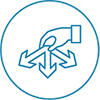 There are many types of waste that cannot be mixed with household waste.
There are many types of waste that cannot be mixed with household waste.
Ordinary waste: sofas, mattresses, green waste, scrap metal, glass, cardboard boxes (emptied and folded), rugs, carpets, wood, electrical appliances, textiles and shoes, paper, magazines, newspapers, furniture, tyres (4 at most per household), waste electric and electronic equipment, clean rubble (earth, stones, concrete, breezeblocks, mortar, cement, bricks, roof tiles, tiling, marble…), dirty rubble (debris from worksites, used cement bags), plate glass, household packaging.
Dangerous household waste: neons, lightbulbs, paint, solvants, used oil, cooking oils, small batteries, dangerous products, soiled drums, batteries, gas cylinders, (1 cylinder per household per year), extinguishers, aerosols, hydrocarbons, petrol, phytosanitary products (fertilizers, weed-killers), ink cartridges, X-rays.
Toxic waste: flammable products, toxic products, harmful products, corrosive products, products dangerous for the environment, oxidizing agents.
NB: The agent at the tip is authorized to refuse waste that may present a risk or danger, or depending on acceptance criteria in each tip.
Find the tip closest to your home.
Where does my household waste go?
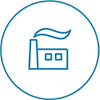 Within the boundaries of the Cannes Lérins Agglomeration, household waste is transported to drop-off points to be eliminated. A large majority of our waste is processed at the Energy Valorization Unit in Antibes and the Organic Valorization Centre in Le Broc.
Within the boundaries of the Cannes Lérins Agglomeration, household waste is transported to drop-off points to be eliminated. A large majority of our waste is processed at the Energy Valorization Unit in Antibes and the Organic Valorization Centre in Le Broc.What becomes of my sorted waste?
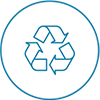 It is first taken to the sorting centre to be separated by type of materials. It is then delivered to professionals specializing in the recycling of each material to begin a new life. This waste provides essential resources for industrialists.
It is first taken to the sorting centre to be separated by type of materials. It is then delivered to professionals specializing in the recycling of each material to begin a new life. This waste provides essential resources for industrialists.
Par example :
• 9 cardboard kitchen rolls = 1 pack of playing cards
• 6 fruit juice cartons = 1 roll of toilet paper
• 18 newspapers = 1 egg box
• 20 water bottles = 1 pillow
• 2 fruit juice cartons = 1 roll of kitchen paper
• 8 tin cans = 1 saucepan
• 15 milk bottles = 1 watering can
• 5 beer cans = 1 insect repellent spray
Recycling also allows for savings in raw materials and energy:
• 1 ton of recycled paper/cardboard boxes allows us to save on wood required to heat a home of 100 sqm for 1 year;
• 1 ton of recycled non-ferrous metals allows us to save the equivalent amount of CO2 generated by 7 round trips between Paris and New York (per passenger);
• 1 ton of recycled non-ferrous metals allows us to save the iron ore required to manufacture a car;
• 1 ton of recycled plastic allows us to save the kerosene required to produce 7 public benches;
• 1 ton of recycled liquid food packaging allows us to save the volume of water required for a French person’s consumption in two months.
Why does my Agglomeration Community manage waste collection?
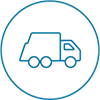 The Agglomeration Community is a legislative obligation arising from the government’s commitment to optimize public resources set in place to improve the quality of life for the inhabitants of a given area. When it was created in 2014, the Cannes Lérins Agglomeration took over the Waste Processing and Tip Management fields of expertise within its territory. In 2017, as per regulations laid down by the NOTRe Law, the five communes comprising the Agglomeration transferred to it the responsibility of Household and Assimiliated Waste Collection, and that of the Collection of illegal waste dumping.
The Agglomeration Community is a legislative obligation arising from the government’s commitment to optimize public resources set in place to improve the quality of life for the inhabitants of a given area. When it was created in 2014, the Cannes Lérins Agglomeration took over the Waste Processing and Tip Management fields of expertise within its territory. In 2017, as per regulations laid down by the NOTRe Law, the five communes comprising the Agglomeration transferred to it the responsibility of Household and Assimiliated Waste Collection, and that of the Collection of illegal waste dumping.
To respond to the obligations that arise from responsibility for Waste Collection and Processing, the Cannes Lérins Agglomeration has organized its activity around the following assignments:
• Waste prevention,
• Management and provision of pre-collection resources,
• Collection of residual waste and recyclable waste,
• Local actions and communication.
The Agglomeration has transferred responsibility for waste processing, including tip management, to two syndicates: UNIVALOM and Le SMED06.
For more questions on waste collection and management, contact:
![]()
04 89 82 20 22
collecte@cannespaysdelerins.fr